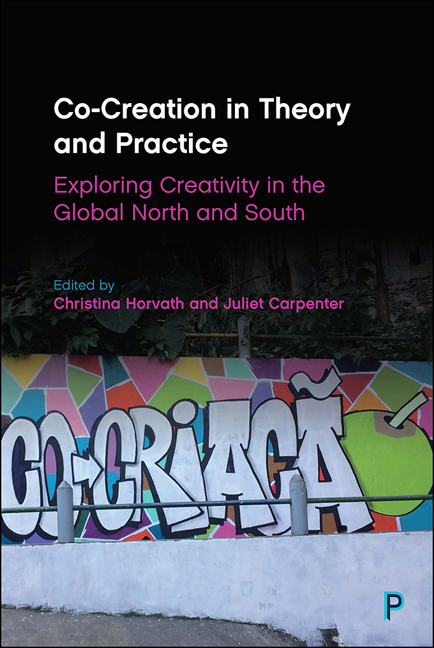2 - Co-creation and the State in a Global Context
Published online by Cambridge University Press: 18 March 2021
Summary
Introduction
Co-creation1 narratives are gaining global currency, with initiatives and governments around the world increasingly using the term to label their activities across very different contexts, in an example of what McCann and Ward (2011) refer to as ‘policy mobility’. This chapter critically explores the implications of this in two ways. First, by drawing on debates about the need for theory to ‘see from the South’ (Watson, 2009), it discusses whether existing definitions and conceptualisations of co-creation, which tend to come from the Global North, can adequately characterise and understand the experience of the Global South. Such debates overlap with decolonial approaches seeking to challenge the geopolitics of knowledge production, which are of particular relevance to considerations of co-creation (see for example Mignolo, 2000; Quijano, 2007). This chapter therefore asks the question: is co-creation a colonising concept or can it be explored in ways which break down dichotomies and change relations between the Global North and South as well as addressing other examples of marginalisation and exclusion?
Second, the chapter focuses on the relationship between cocreation and the state as a way of illustrating these debates in more depth. In liberal democracies, the ideal of co-creation sees communities and the state working together in addressing inequalities, allowing voices to be heard, providing emancipatory potential and thus changing the relationship between the state and its publics. But as Pritchard's (2017) critique among others points out, in both the Global North and South, such initiatives can be coopted by the state and other agencies as a way of devolving responsibilities, implementing growth-oriented urban agendas and organising voluntary effort leading to the potential cooption of groups and initiatives into a restrictive narrative of co-creation. In other more extreme cases, an oppressive and militarised state can close down spaces of co-creation. How do projects and communities navigate these differing contexts, and what forms of co-creation emerge within them?
These questions are significant ones for a project that brings together partners from the Global North and South, but the origins of which could arguably be seen as adding to the colonisation of urban theory and practice.
- Type
- Chapter
- Information
- Co-Creation in Theory and PracticeExploring Creativity in the Global North and South, pp. 23 - 40Publisher: Bristol University PressPrint publication year: 2020



